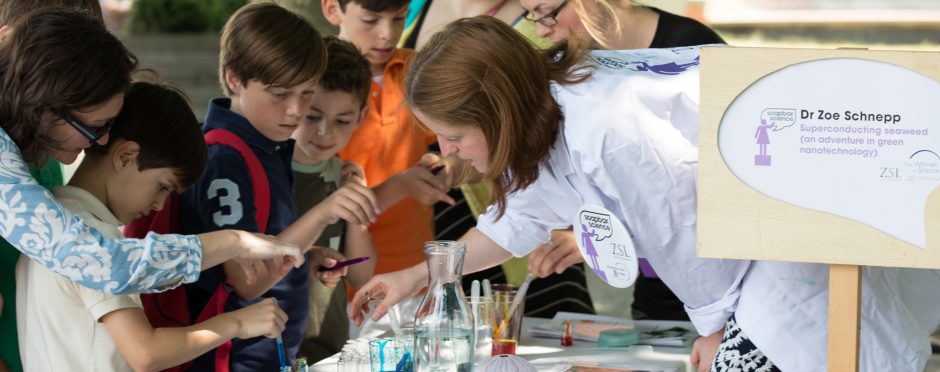 Katherine Rumble is a PhD student at the University of Edinburgh conducting experiments on soft matter systems, otherwise known as squishy things. Catch Katherine on the 24th of July, at our Edinburgh event!
Katherine Rumble is a PhD student at the University of Edinburgh conducting experiments on soft matter systems, otherwise known as squishy things. Catch Katherine on the 24th of July, at our Edinburgh event!
SS: Katherine, how did you get to your current position?
KR: At school I was one of those people who enjoyed almost all subjects so I found every decision about what to study very difficult. I agonised over my A-level choices, the restrictions in what subjects you could take in combination helping me slightly but eventually ended up studying maths and science subjects. At 17 I couldn’t decide which of my two favourite subjects (chemistry and maths) I should take for a degree and my mum suggested a natural sciences degree which would allow me to study both. And so I ended up studying Natural Sciences at Durham University which gave me the flexibility to cross scientific disciplines although I mostly restricted myself to chemistry and maths. I spent two of my long summer holidays during my undergraduate degree working in research labs and having enjoyed them I chose to do a PhD once I’d graduated. Rather bizarrely I have ended up in a physics department studying soft matter which is a very interdisciplinary science.
SS: What, or who, inspired you to get a career in science?
KR: I’ve always enjoyed problem solving and when I was younger science provided an excellent outlet for this. I’m also a bit of a control freak and the meticulousness of scientific experiments really appealed to me. It was, however, only at A-level that I started to really enjoy chemistry and chose to include it in my degree program. This was mostly the fault of two brilliant chemistry teachers I had for my A-levels, Mr Loveall and Mr Crewe. My parents have also been very supportive and always encourage me to do what makes me happy.
SS: What is the most fascinating aspect of your research/work?
KR: What I enjoy the most is the creative aspect of science for example designing experiments based on the equipment we have in the lab and the time available to do it in. Balancing the need to be precise with what you are doing and flexible with how you can achieve it is really satisfying. Of course the best feeling is when the pieces of something you’ve been working on for a really long time finally all fall into place.
SS: What attracted you to Soapbox Science in the first place?
KR: A problem I have found with outreach events, such as science festivals, is that they tend to attract only a subgroup of the general public who, for one reason or another, have specifically chosen to be there. However, there are plenty of people who don’t come to such events and Soapbox Science is an event where a whole range of people who happen to be passing by can get involved. Soapbox Science also helps to break down stereotypes in science by making female researchers visible to the public. Although there are plenty of women working in science most of the well-known scientists, for example TV presenters, are men and this reinforces the stereotypical image of a scientist.
SS: Sum up in one word your expectations for the day – excitement? Fear? Thrill? Anticipation?
KR: Terrifying but also fun.
SS: If you could change one thing about the scientific culture right now, what would it be?
KR: I would like to tone down the competitive aspect to the scientific culture to make it more inclusive and supportive.
SS: What would be your top recommendation to a female PhD student considering pursuing a career in academia?
KR: I am currently in this position myself however I would say this which can apply at any stage of your career, whatever study or career path you want to take don’t let anyone else’s opinion stop you from doing it.
